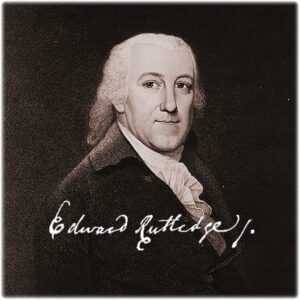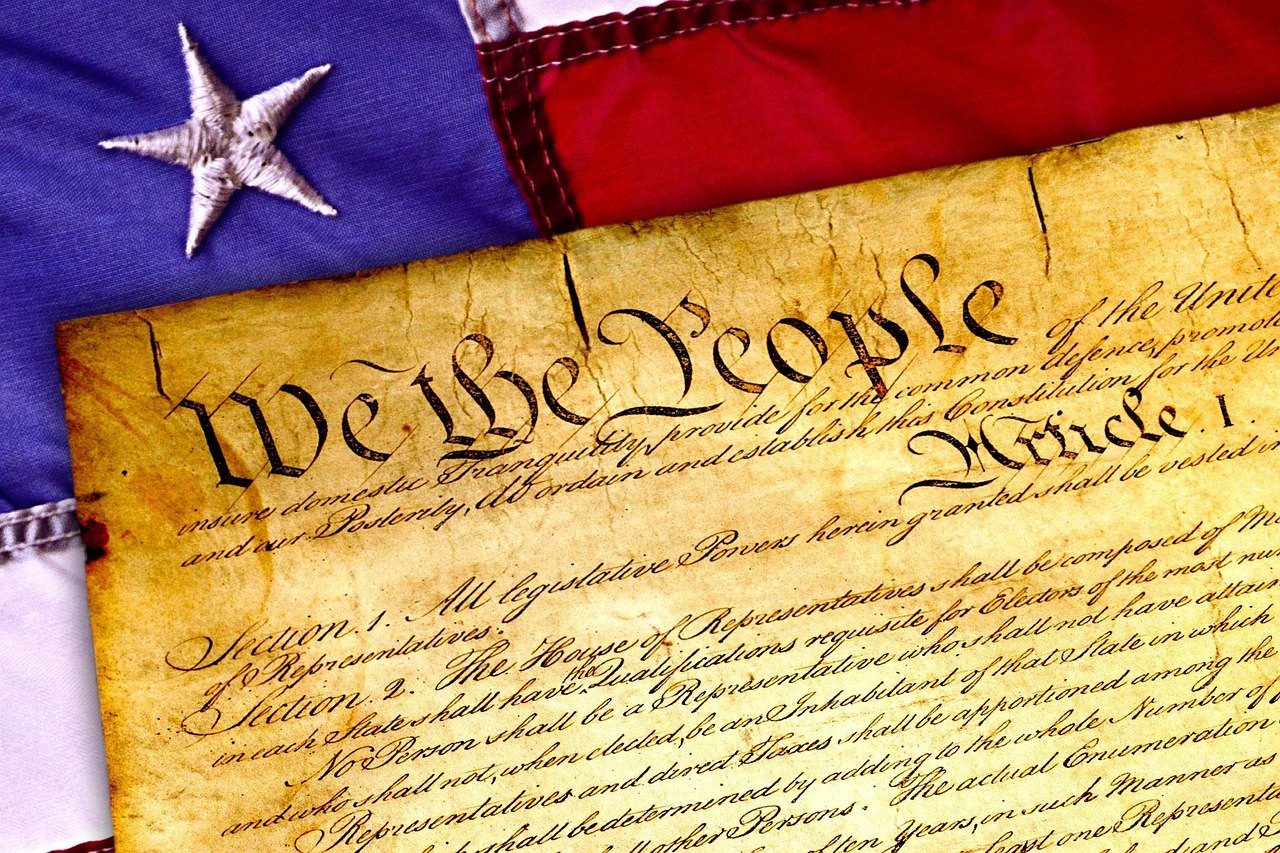
Edward Rutledge was a South Carolina lawyer and politician who was the youngest signer of the Declaration of Independence. He saw combat with the South Carolina Militia, was a prisoner of war, returned to Congress and was an author of the Articles of Confederation. Rutledge was active in South Carolina politics and served one term as governor before his death at the early age of 50. Edward Rutledge is not well known but was a founding father, patriot, and American hero.
Edward Rutledge was born into an aristocratic South Carolina family on 23 November 1749 in Charleston. He was the youngest of the seven children of John Rutledge and Sarah Hext. John Rutledge was a successful Charleston Physician who had emigrated from Ireland about 1735. Sarah Hext was “a lady of respectable family, and large fortune.” Her grandfather, Hugh, came to South Carolina from England about 1686. Her father, also named Hugh, left Sarah substantial lands inherited from the Fenwick family, two homes in Charleston, a 550-acre plantation at Stono, and 640 acres on St. Helen’s in Granville County.
We know little about Edward Rutledge’s early years, but he was tutored by David Smith from New Jersey. Reportedly, he was a mediocre student. Later he read law with his brother John, who was already a distinguished member of the Charleston bar.
When Edward was 20 years old, he traveled to England to study law at The Temple, an ancient institution for teaching law founded by the Knights Templar in 1185. Many famous South Carolinians had attended Temple including Edward’s uncle Andrew and his brothers John and Hugh.
In 1772 Edward was admitted to the English bar and he returned to Charleston where he began his law practice. Charles Cotesworth Pinckney was his law partner and their practice flourished. As their practice grew and they established a reputation, they became leading citizens of Charleston.

On 1 March 1774 Edward married Henrietta Middleton, who came from an aristocratic South Carolina family. She was the sister of Arthur Middleton who would also sign the Declaration of Independence. The couple had three children, one who died in infancy.
Henrietta’s wealthy father had extensive political connections and influence and he helped advance Edward’s career. Edward was elected to the South Carolina House of Representatives, and in 1775 he and his brother John were selected to serve on of the South Carolina delegation to the Continental Congress.
The Rutledge’s both favored independence according to John Adam’s autobiography. However, the South Carolina legislature instructed the delegation to oppose independence. They believed the time was not yet right, and that the British military would crush them if independence was declared too soon.
Following instructions, Edward Rutledge became one of the most ardent opposers of Richard Henry Lee’s June 1776 resolution for independence. When a trial vote was taken on 1 July, the entire South Carolina delegation voted “no.” The South Carolina Legislature than notified Rutledge to vote in favor of independence and the next day the delegation reversed their vote. This made the independence vote unanimous, at 12 to 0 with New York abstaining. Edward signed the Declaration of Independence in August, the youngest signer at 26 years old.
Even before the independence resolution was passed, Edward was selected to represent South Carolina on the committee to draft the first constitution, the Articles of Confederation. Again, he was a voice of opposition to the draft because he recognized its shortcomings. In a letter to John Jay, he wrote: If the proposed plan is adopted “nothing less than Ruin to some Colonies will be the Consequence…” and “I am resolved to vest the Congress with no more power than what is absolutely necessary.” The Confederation was debated passionately for months and finally completed and signed on 15 November 1777. Ratification was not achieved until 1781.
In September 1776 Edward, John Adams, and Benjamin Franklin were selected to attend a meeting on Staten Island that had been requested by Lord Admiral Richard Howe. Nothing was accomplished because Howe had no power to change anything. In a letter to his good friend General George Washington, Edward reported the meeting was pleasant, but Howe had been directed to only “consult, advise & confer with gentlemen of the greatest influence in the Colonies about their complaints.”
In 1779, illness prevented Rutledge from continuing service in Congress and he returned to South Carolina. He then took a seat in the South Carolina General Assembly and was appointed to the rank of Lieutenant Colonel in the Charleston Battalion of Artillery. He served with this unit in the victory at Port Royal Island under the command of General William Moultrie.

On 12 May 1780 Edward and fellow Declaration signers Thomas Heyward Jr. and Arthur Middleton were captured by the British during the siege of Charleston. They were held in a prison ship off the coast of St. Augustine for eleven months and were released during a prisoner exchange in July 1781.
After his release, Edward served in the General Assembly until 1798. He voted to ratify the U.S. Constitution during the South Carolina Constitutional Convention in 1790-1791. He was an active legislator known for his advocacy of confiscation of Loyalist property. During this period Rutledge’s wealth increased substantially. His law practice was flourishing, and he was making profitable investments in plantation property.

Henrietta Rutledge died on 22 April 1792. She had been in ill health for years. Henrietta was buried at Saint Philips Episcopal Church Cemetery in Charleston. Later in the year Edward married Mary Shubrick Eveleigh a young widow. Two of Mary’s sisters also married signers of the Declaration of Independence-one married Thomas Heyward, Jr. and one married Thomas Lynch, Jr.
Edward Rutledge opposed the Jay Treaty with Britain and believed the Federalist party’s policies favored the British. He was an elector in the 1796 presidential election and voted for Republican Thomas Jefferson and Federalist Thomas Pinckney. John Adams won the Presidency. Adams was not a fan of Rutledge or any South Carolinian. However, Rutledge approved of Adam’s defense policies towards France during the Quasi-War. Later, he believed the Republicans became too partial to France, and he cut off contact with Vice President Jefferson.
Rutledge served in the South Carolina senate for two years and was elected governor in1798. He died in Charleston on 23 January 1800 before serving his full term. He was given an impressive military funeral with many honors for his long service to the nation and state. He was buried in St. Philip’s Church Cemetery. In 1969 the South Carolina Daughters of the Revolution placed a marker at the entrance of the cemetery that honored Rutledge and Charles Pinckney. The church was designated a national historical landmark in 1974
Edward Rutledge was recognized by his peers as intelligent, generous and an eloquent orator. As noted above John Adams did not have much use for many southerners, especially South Carolinians, and particularly Edward Rutledge. Adams considered him to be “a peacock who wasted time debating upon points of little consequence.” and “a perfect Bob-O-Lincoln, a swallow, a sparrow…jejune, inane and puerile.” Adams had an opinion on everyone and did not mince words.
On the other hand, Benjamin Rush of Pennsylvania thought Rutledge was a sensible young lawyer and useful in Congress, but he also noted his “great volubility in speaking.” Patrick Henry of Virginia rated Rutledge as the greatest orator among a group that included Samuel Adams, John Jay, and Thomas Jefferson.
Edward Rutledge was very young compared to other delegates when he first entered national politics so there probably were some that considered him to be too young for his position. No matter what the opinions of others, Edward Rutledge debated and signed the Declaration of Independence, helped author the Articles of Confederation, and was selected for the delegation that met with Lord Howe. He was also a combat officer, a state politician, and a state governor. Not bad for a person of any age. He helped establish and develop the United States of America. Edward Rutledge was a patriot and an American hero.
